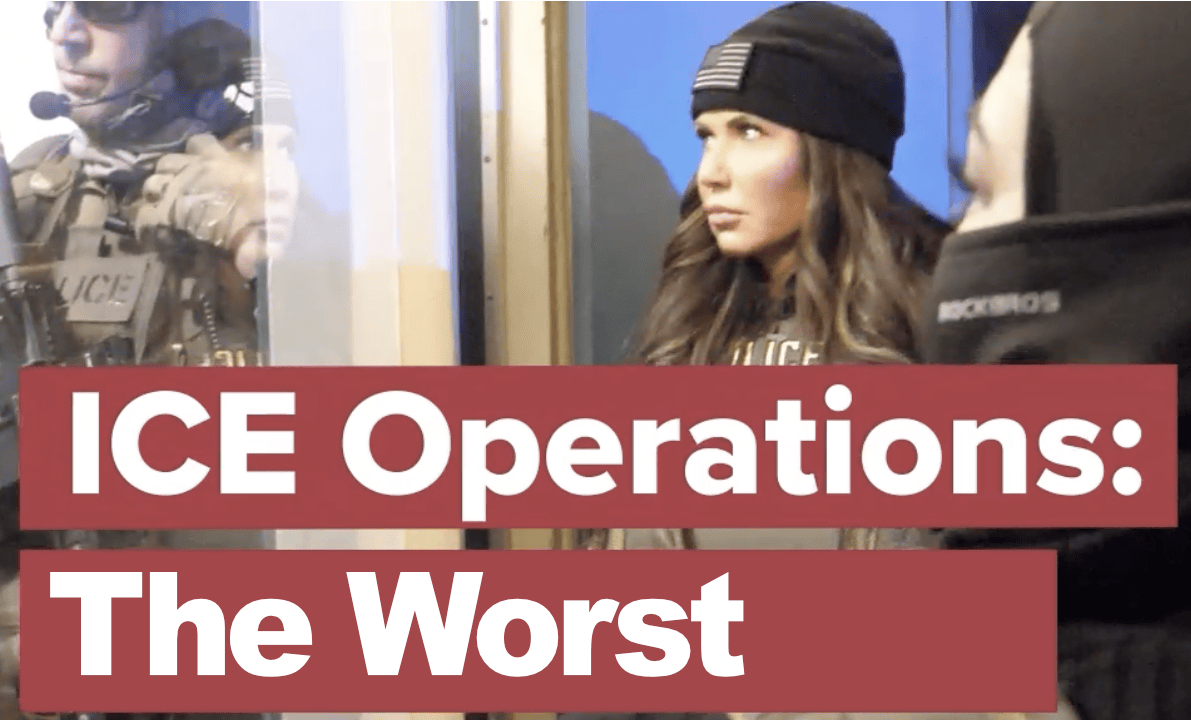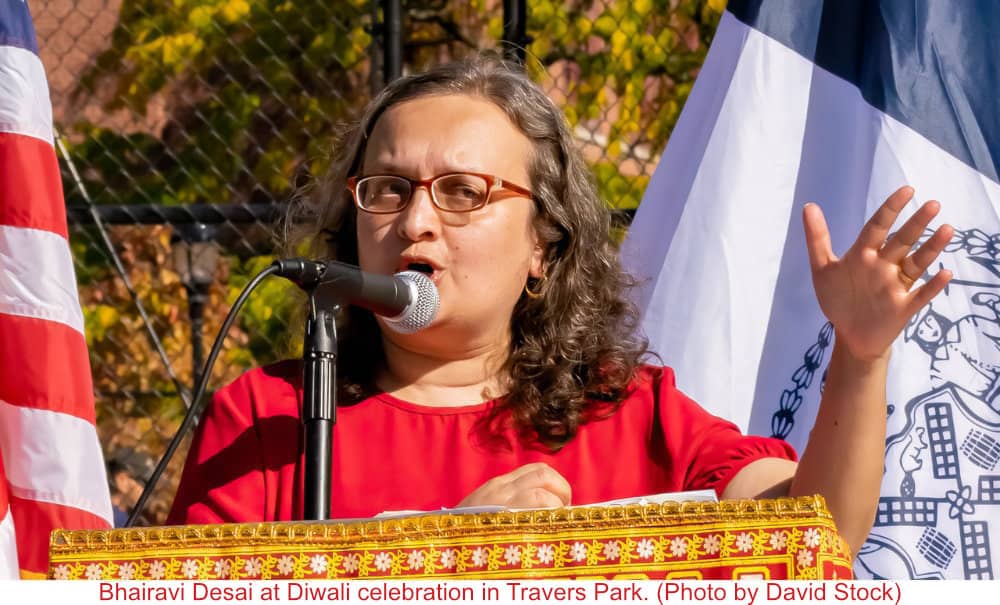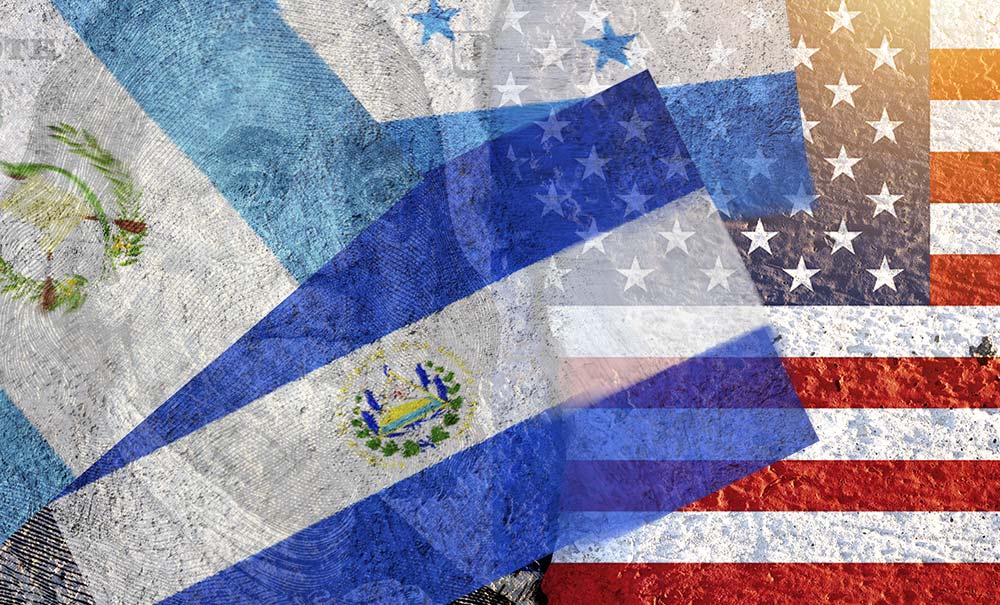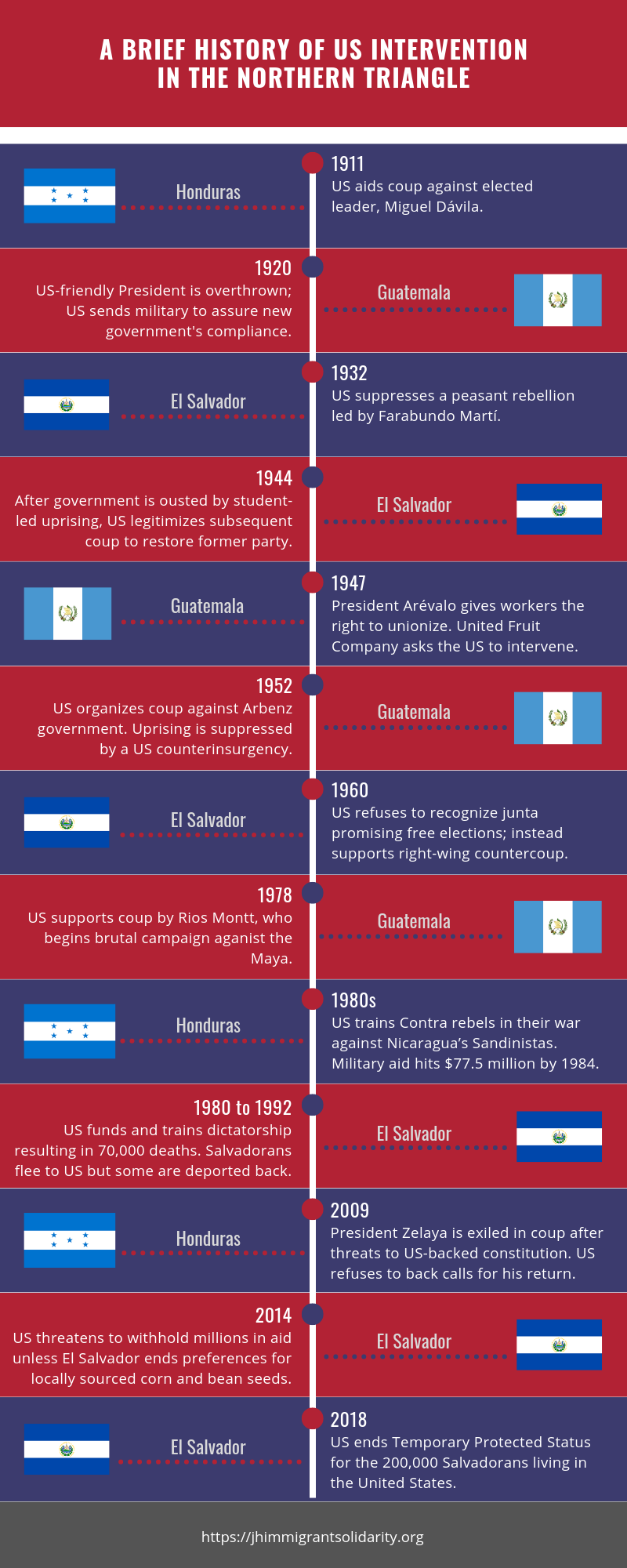
Dear Friends,
Greetings in a time of emergency and resistance. Across the nation today and in all 50 states (including Bryant Park, Weehawken, and Staten Island) at 1:00 PM the people are demonstrating to demand: an end to the billionaire takeover and rampant corruption of the Trump administration; an end to slashing federal funds for Medicaid, Social Security, and other programs working people rely on; and an end to the attacks on immigrants, women, workers, trans people, and other communities.
The breadth and speed of the Trump regime’s assault on immigrants has been stunning, but not unexpected. Starting immediately after the election, immigrant justice advocates began to regroup. They are looking for ways to draw community allies closer, filing defensive lawsuits, pushing for protective legislation, and conducting intensive “know your rights” campaigns. In our first article, we review the anti-immigrant steamroller of federal actions. In our second article, we look at state and local legislation proposed by local progressive politicians and prioritized by grassroots immigration activists. We conclude with a partial timeline of the deportation machine that is growing ever bolder.
Newsletter highlights
- The stunning number of attacks and deportations
- Pro-immigrant legislation working its way through our state legislature
- A timeline of disturbing deportation actions
1. 76 Days Later: The Cruelty and The Deprivation
“The second Trump administration began with a slew of executive orders designed to terrify and devastate immigrants, their families, and communities across the United States.”—National Immigration Law Center
After trying to make Americans fear immigrants as invaders, the Trump administration is now leveraging the Alien Enemies Act of 1798 in the same way it was leveraged during World War II to round up US Citizens of Japanese descent, steal their homes and property, and imprison them in concentration camps. AI has been used to identify and revoke the visas of academics for their campus protests over Gaza. Long-time green card holders are suddenly losing legal status and facing deportation. The citizenship of people born in the US is being challenged, as is that of naturalized citizens.
The National Immigrant Justice Center (NIJC) states that “ALL people in the United States have rights, regardless of their immigration status.” The NIJC advises people to seek legal counsel. But law firms have capitulated to Trump’s unconstitutional lawfare threats to ban legal firms from access to government buildings, meetings or jobs. It is therefore no surprise that individuals and non-governmental organizations may also capitulate. Thus, the Quaker organization, American Friends Service Committee currently guides Venezuelans less about their rights to stay, and more on how people can mitigate the damage by securing a family’s legal power of attorney, managing financial protections, gathering official documents, and avoiding scams related to legal representation for when people are deported.
The White House press secretary makes the absurd argument that opposition to Homeland Security sending people with tattoos to El Salvador’s Terrorism Confinement Center equates to support for vicious gangs. But when the federal government’s deportation machine vanishes people, without orders of deportation, from the US to El Salvador, or Guantanamo, or from any US state to Louisiana’s remote and abusive ICE facilities, then the expectation of constitutional rights for anyone vanishes.
Recently Victoria Spartz, an immigrant Republican member of Congress from Indiana, actually stated in a public town hall: “You violated the law, you are not entitled to due process.” Yet the very purpose of the Fourth Amendment is to place “restraints on the government any time it detains (seizes) or searches a person” and the Fifth Amendment establishes no one shall be deprived of life, liberty or property without due process of law. Due process is reiterated in the 14th Amendment and all of these apply against the US government rather than being granted to individuals.
Homeland Security admits that only 137 of the 238 people were deported to El Salvador as “enemy aliens”; so it deported 101 people to a brutal high-security prison in another country under “regular immigration procedures.” The Trump administration even paid El Salvador over $25,000 per person, for the year, to make them disappear. Their rationale is that it is cheaper than housing them in private prisons. Homeland Security will also not facilitate communications with any lawyers because these people have already been removed.
There have been so many anti-immigration actions recently taken it is challenging to summarize them. The arrest of Palestinian activist Mahmoud Khalil, the first of many students arrested for their protest actions, suggests that the government is punishing and silencing free speech, or removing the privilege of one’s visa status based on ever-changing political opinions on foreign policy. It is vital to see these actions together, rather than as disjointed news articles. At the end of today’s newsletter we have compiled a partial timeline for you to read, in one place, the key actions reported on by various news sources…many of these sources Trump and his administration are seeking to delegitimize, defund or punish because they report facts instead of amplifying his talking points.
WHAT CAN WE DO?
- Join Amnesty International’s campaigns to release Mahmoud Khalil and tell Congress to stop the funding of mass deportations and inhumane border policies
- Act along with the ACLU and demand elected leaders be vigilant and speak out against mass deportations and the president’s unlawful invocation of the Alien Enemies Act.
- Subscribe to a new immigration podcast Unsettled, and listen to the National Constitution Center discussion explaining how the recent use of The Alien Enemies Act of 1798 does not meet the requirements of wartime action it requires.
2. Pro-Immigrant Reps Sponsor Protective Legislation
Fighting to stop the Trump regime’s anti-immigrant juggernaut requires resistance on many fronts. One of those is passing state and local legislation to protect immigrants from ICE abuses. New York voters have sent many progressives to the City Council and Albany. Now some of these politicians, including representatives from our neighborhood, are working with grassroots organizations on measures to prevent mass deportation and ensure due process.
One key piece of proposed legislation is the New York For All Act. This law would formalize a number of sanctuary provisions at the state level. It is strongly supported by Make the Road New York, which is using statehouse rallies and a phone call campaign to push it forward. As MTRNY describes it, the Act:
- Would prohibit state and local officials from enforcing federal immigration laws or transferring people to ICE custody.
- Block ICE and CBP from entering non-public areas of state and local property without a warrant.
- Ensure that people in custody receive notice of their rights before being questioned by ICE.
- Begin the process of restricting ICE and CBP access to state databases.
MTRNY specifically highlights the need to keep New York’s DMV database—which includes information on undocumented drivers—out of the hands of ICE.
On March 12, the New York City Council sent a message to the state legislature supporting the New York For All Act. During the same session, they also endorsed the Access to Representation Act, cosponsored by local Assemblyperson Catalina Cruz. This bill would “establish the right to legal counsel in immigration court proceedings.”
Cruz has been particularly active in generating pro-immigrant legislation. Her Protect Our Schools Act, co-sponsored by several other local lawmakers, is designed to prevent ICE from entering or making arrests in any state schools without a judicial warrant. Cruz presented this legislation as part of a trio of bills. The other two parts of her package include a law that targets rampant fraud by immigration “advisors,” and another guaranteeing proper translation of all immigration proceedings. The need for translation services and “language justice” is also reflected in a recent NY City Council decision to create a Language Access Bank, and to fund the translation work of local immigrant organizations.
Cruz and other Queens-based legislators are also among the 54 sponsors of the Dignity Not Detention Act. As we reported previously, this proposed law “prohibits governmental entities from entering into agreements to house individuals in immigration detention facilities; requires governmental entities to terminate existing contracts for the detention of individuals in immigration detention facilities.” It is supported by a wide range of immigrant justice and civil rights groups.
Legislation can be an important weapon to defend immigrants. But its success depends on the strength of progressive sentiment: first of all in electing pro-immigrant representatives, and then in backing them up to get just laws passed. It remains to be seen how New Yorkers, including Governor Hochul, respond to recently proposed progressive legislation in the face of the current wave of xenophobia.
WHAT CAN WE DO?
- Participate in Make the Road’s phone-in for the New York for All Act.
- Learn about the Language Justice Collaborative, which trains and provides interpreters for African, Asian and Latin American immigrants.
3. A Partial Timeline Of Deportations And Actions
Jan 20 – As promised on day one of being a dictator, Trump signed blatantly unconstitutional paperwork to eliminate the 14th Amendment right to birthright citizenship by executive order and began to eviscerate due process in the immigration system. He also began the process of weaponizing the military against immigrants.
Jan 21 – Alfredo Orellana, a green card holder married to a 6 months pregnant US citizen, was detained after returning from a trip to El Salvador. Originally born in Argentina 31 years ago, Orellana has lived in the US since he was 4 years old.
Jan 25 – German tourists entering the US on valid travel documents were held in ICE detention for 46 days and then deported.
Jan 31 – US Citizen Julio Noriega was swept up in warrantless arrests by ICE in Chicago and given no opportunity to discuss his citizenship. He was released, after being held by Homeland Security for 10 hours, with no money and no paperwork to explain the reason for being held or released.
Feb 1 – TPS was suddenly suspended for 472,000 Venezuelans. Under Biden, the end date had been extended to October 2026. It was shortened to April 7, 2025 which Homeland Security would use to justify their deportation in weeks. A federal judge later halted the suspension pending court hearings.
Feb 4 – A 10-year-old US Citizen with brain cancer was deported from Texas to Mexico with her entire family while they were driving to a medical checkup in Houston from border town Rio Grande City. Other than lacking “valid immigration status in the U.S.,” the parents have “no criminal history,” and they have been deported to a region known for kidnapping US citizens. Heritage Foundation fellow and Project 2025 contributor, Tom Homan, who is not a Cabinet member but wields control over immigration policy with the official title of Border Czar, is known to have cold disregard for the US citizenship of 4 million children who have an undocumented parent. He stated that the parents will decide when to break up a family, not the government.
Feb 7 – Department of Homeland Security (DHS) Secretary Kristi Noem directed Treasury Secretary Scott Bessent to deputize IRS criminal investigators, to “assist in immigration enforcement”. Acting IRS Commissioner Doug O’Donnell rejected the plan for the IRS to share the addresses of the people in their databases. Three weeks later the 40-year veteran of the IRS, O’Donnell, retired. His replacement, Melanie Krause, is willing to accept the plan to allow the Department of Government Efficiency known as DOGE (most accurately pronounced “dodgy”) access to the address data. Many point out this situation contradicts Trump’s typical narrative that the immigrants he attacks as illegal are a social burden and don’t pay taxes.
Feb 14 – Using a law from WWII, Kristi Noem announced the plan to create a Migrant Registry and require those who are undocumented to come forward or face criminal penalties.
Feb 15 – Camila Muñoz was detained by an immigration agent when she and her Trump-voting husband returned from their honeymoon in Puerto Rico. Her unlawful action was letting her immigration paperwork expire during COVID when she was not allowed to travel. The husband blames the system, not Trump. But within a month he was considering moving back with her to Peru.
Feb 19 – German tourist Lucas Sielaf, and his US Citizen fiancée were held by ICE for two weeks after going to a vet in Mexico.
Feb 20 – Secretary Noem suddenly amended the period of extension and redesignation of Haiti for TPS from 18 months to 12 months. The new end date is August 3, 2025 which Homeland Security would use to justify their deportation.
Feb 25 – While tearing down all rights related to immigration, Trump announces that wealthy immigrants will soon be eligible to purchase a gold card path to citizenship for $5 million. Unlike the EB-5 entrepreneurship visa that requires people to invest in a business over time in the United States, this gold card requires only one payment and will be open to Russian oligarchs who Trump said “are very nice people”.
Feb 26 – Becky Burke, a 28-year-old backpacker from Wales, UK, was held in chains after crossing into the US from Canada; possibly due to the agent’s opinion that the free housing she received was considered payment in return for her helping them with housework.
Feb 28 – Lewelyn Dixon, a 50-year resident and green card holder, was held in ICE detention in Tacoma when returning from a trip to the Philippines. Her family did not know until March 2 and were not informed why she was being held. She is currently scheduled for a hearing in July.
Mar 6 – Ma Yang, from Milwaukee, is 37 and has lived in the US since she was 8 months old: in mid-February she was detained during a regular US Immigration and Customs Enforcement check-in meeting, separated from her US citizen partner and children, then deported to Laos. Born in Thailand, Laos is a country she has never even visited.
Mar 7 – A German mother and son, both with permanent residence status, were held at Logan airport with no explanation as to what had flagged the son’s green card. The son had to be hospitalized after release because he had been “deprived of sleep, food and water, and had his anxiety medication withheld.” while he was held.
Mar 8 – Mahmoud Khalil, a permanent resident and recent graduate of Columbia University, was the first of known student protesters of the Gaza conflict to be taken by Homeland Security agents. His 8-month pregnant US citizen wife was also threatened with arrest. After being transferred to ICE custody in Louisiana, he was flown closer to home to a New Jersey detention center at the demand of a federal judge. [Correction: Khalil was not flown to NJ; a judge transferred his case to NJ at the request of his lawyers, and some of his hearings are being held in NJ as he remains caged in Louisiana and appears remotely]. Trump demanded the compliance of all universities and said “This is the first arrest of many to come.” [Update: On April 11 a judge ruled that Khalil can be deported, but due process is required as the United States government must successfully argue their preposterous case that his presence posed potentially serious foreign policy consequences.”]
Mar 10 – A Venezuelan couple, with Temporary Protective Status (TPS) and valid work authorization, were grabbed by Border Patrol in Washington, DC and separated from their three children. A judge said their arrest was “baseless and unlawful” and the Border Patrol’s assistant commissioner of public affairs, Hilton Beckham, alleged, “without evidence, that the couple had ties to the Tren de Aragua gang”. Megan McFadden, an attorney for the federal government, admitted she had not heard the couple had valid TPS paperwork.
Mar 11 – Ranjani Srinivasan, a Columbia University student from India, was concerned about being detained illegally, with no criminal charges after her visa was revoked. Srinivasan is another student who has shown support for Palestine throughout Israel’s brutal war on Gaza. The university did not prevent ICE agents from accessing university housing without a judicial warrant and she chose to fly to Canada.
Mar 14 – Dr. Rasha Alawieh, a kidney transplant specialist and professor at Brown University’s medical school, was denied entry at Boston Logan International Airport on a Thursday. The day after her airport detention, US District Judge Leo Sorokin (who was the fourth federal judge to block the attack on birthright citizenship) set a hearing for the following Monday. The hearing was canceled after she was deported to Paris under suspicion of support for Hezbollah.
Mar 14 – The visa of Momodou Taal, a graduate student at Cornell University, was revoked. The United Electrical union supports him because, if the federal government is allowed to come for Taal, they will be emboldened to come for anyone who challenges climate policies, stands for the rights of women and LGBTQ+ rights, racial justice, and workers’ rights.
Mar 14 – Ranjani Srinivasan, a Columbia University student from India, chose to self-deport using the redesigned CBP Home App after Homeland Security revoked her visa on Mar 5. [Correction: Ranjani Srinivasan, a Columbia University student from India, did not self-deport using the CBP app: that claim was official propaganda disinformation on ex-twitter from Kristi Noem. On March 14, Srinivasan’s lawyer’s informed ICE she had left the country three days earlier.]
Mar 15 – Homeland Security ignored a judicial ruling requiring planes, headed to El Salvador with over 200 deportees, to return to the US. A video was released showing their delivery to the notorious Terrorism Confinement Center in El Salvador, whose president mocked the order by posting on social media, “Oopsie…Too Late,” The US paid El Salvador $6 million to take them for a year and provided no proof these people were members of the Tren de Aragua gang. Trump then floated the idea of sending US Citizens to prisons outside the country.
Mar 17 – Jeanette Vizguerra, an immigrant rights advocate with the American Friends Service Committee in California, evaded deportation in 2017 by seeking sanctuary by living in the basement of a church with her children. She was taken into custody near the Target store where she worked.
Mar 17 – Badar Khan Suri, an Indian national and postdoctoral fellow at Georgetown University was detained by masked federal agents outside his home. Suri’s lawyer stated Suri is being punished because of the Palestinian heritage of his US citizen wife because the government suspects they both oppose US foreign policy toward Israel.
Mar 18 – Using false narratives about immigrants increasing crime resulted in an ICE raid in Boston that rounded up 370 people, many of whom were legally in the US and going through the asylum process.
Mar 24 – Yunseo Chung, another permanent resident student at Columbia University, files a lawsuit against members of the federal government for their action against her, claiming “She is being sought for removal proceedings under the immigration laws” for engaging in what they claimed as concerning conduct in a pro-Hamas protest at Barnard College. Chung’s suit states this is a “larger pattern of attempted US government repression of constitutionally protected protest activity and other forms of speech”.
Mar 25 – Alireza Doroudi, an Iranian Graduate student at the University of Alabama, had his visa suddenly revoked and at 3 a.m. agents took him into custody and removed him to an ICE facility in Jena, Louisiana which is holding several international students targeted by Homeland Security. Fortunately, his finacée was able to share his story and people mobilized to help support his legal defense.
Mar 25. – Rumeysa Ozturk, a Massachusetts graduate student at Tufts University, had her visa suddenly terminated and she was grabbed off the street and taken into federal custody by masked agents who are not clearly law enforcement. She had co-authored an essay in the student newspaper demanding that Tufts acknowledge the Palestinian genocide.
Mar 27 – ICE executed an arrest on a farm in Sackets Harbor, New York, the hometown of Border Czar Tom Homan. Agents entered a different home on the property, without a judicial warrant, detained a mother and her three children, and moved them to a detention center in Texas. Homan claims they were moved for safety as potential witnesses to crime. NY Governor Kathy Hochul stated, “I want this family returned to New York state and believe ICE needs to immediately answer for these actions.”
Mar 31 – Seventeen more alleged gang members were flown to the El Salvador high-security prison. To avoid directly challenging the judicial ruling to prevent such deportations, the administration did not leverage the Alien Enemies Act.
Mar 31 – Robert Cerna, the Acting Field Office Director for ICE filed a declaration admitting that an administrative error sent at least one person, Kilmar Abergo Garcia, to the supermax prison in El Salvador. Despite the wrongful deportation, Homeland Security says they will not facilitate his return because they have no jurisdiction since he is no longer in US custody. Karoline Leavitt, the White House Press Secretary, defended the action and continued to state that this person was a convicted gang member – but provided no proof to back up that claim.
Apr 4 – A federal judge ruled that Kilmar Abergo Garcia must be returned from El Salvador by Monday because of the Trump administration’s illegal action deporting him. In response, the White House deputy chief of staff called the judge a Marxist and the White House press secretary suggested the judge contact the El Salvador president because the US no longer has jurisdiction.
In Solidarity,
JHISN
Follow @JHSolidarity on Facebook and Twitter and share this newsletter with friends, families, neighbors, networks, and colleagues so they can subscribe and receive news from JHISN.


